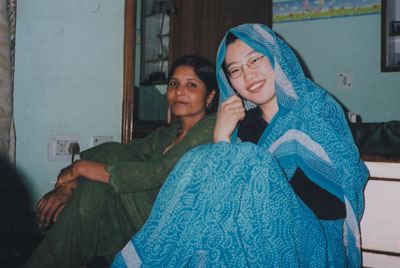
Hwang, Ko Young-eun (English Language & Literature, 3), Lim Soo-jin (Engineer, 2), and Lee Kyeung-jin (Chinese Language & Literature, 2) were the four Ewha students that joined a volunteer program to India organized by the association "India Sopung." They were joined by 12 other volunteers, and together they headed toward an orphanage in New Delhi, India.
The group entertained the children with balloons, origamy (paper folding), and other games that they had prepared long before leaving for India. Though people know Indian people to speak English as well as Hindi, in reality only the educated adults spoke English. So the volunteers had to cope with the language barrier at first. However, the barrier disappeared shortly after. Ko explains this with the example of one of the girls they met. There was a girl who could not speak. Despite her inability to express herself in language, people became fond of her. "Language isn"t the only way to communicate. Through actions, gestures, and expression we were able to connect with the little girl," says Ko.
"We were mesmerized by the bright faces of the children. With their large dark eyes and big smiles, the bronze children swirled in circles around us," says Hwang with a smile in remembrance. "The children sang, danced and drew us pictures because they wanted to do something in return for us. We received more than what we gave," she adds.
With a promise to return, the volunteering students set off backpacking across the vast Indian subcontinent. Students rode camels in the desert of Jaisalmer, saw the City Palace in Jaipur, the Taj-Mahal in Agra, and the Ganges River in Varanasi. "Though I was frightened by the height of the camel, I had a hard laugh looking at the exceptional look on its face. In India even the camel had reached the highest state of spiritual awakening!" says Hwang chuckling.
The cities were always crowded with swirling bicycles, auto-rickshas and beat-down cars; scurrying monkeys; reposing beggars; and as expected, roaming "street cows." Everywhere Korean students went, they were the focus of attention. "Indians were intrigued by us. They actually found us cute because of our small features. How good it is to know that each society has different standards for beauty," says hwang.
They ate Thali, the most ubiquitous food in India made of rice and Chapatis (flour tortillas) with their hands. After answering the call of mother nature, local civilians would clean themselves with the water from the faucet installed in the restroom. A distinct culture; nevertheless one worthy of respect.
The first word heard upon arriving and the last word said upon departure was "Namaste." Two hands are pressed together and held near the heart with the head gently bowed as one says the word. The gesture is the bringing together of spirit and matter, and the words spoken signify the highest possible reverence toward another: "Namaste," signifying "I honor the Divinity within you."
As she pondered over the meaning of Namaste, Hwang comments, "Everyone is a small galaxy. And when all the small galaxies come together, they form the universe. How beautiful it would be if people saluted each other with the conscience of Namaste."
neyessioui@ewha.ac.kr
Ewha Voice
evoice@ewha.ac.kr

